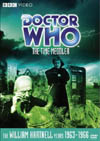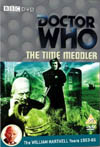DVD Extras include:
Episode One - The WatcherTo start with, we get a beautiful angle of the TARDIS materializing in a nice, atmospheric sequence. The Monk's watchful eye helps focus attention on the effect as well. Too bad Camfield didn't pick up on the idea of reversing the sound for landings, though - Richard Martin still has one tiny one up on him. I also don't know about the superimposed titles for episode one - there's a bad risk of totally blurred whitewash if the recording drops a generation or two. Luckily, credit legibility improves for the remaining episodes.Steven joins the crew properly at this point, and his perspective allows the story and the episode to stand alone and be watchable to anyone who has never seen the series before. Excellent. The sub-plot about whether or not he will believe in the TARDIS's time traveling ability is a good source of thoughtful drama as well. William Hartnell turns in a good performance, as the Doctor has plenty of interesting scenes this episode and gets nicely intrigued by a mysterious set of anachronisms that only he and his friends can really notice. His interaction with Edith is refreshingly pleasant. The Gregorian chants lend a wonderful atmosphere to the episode, apart from providing yet another important clue. This is an excellent half-hour.
Episode Two - The Meddling MonkHere we get a Doctor-less episode, and a disappointing one at that. This one needs the presence of the Doctor via a good pre-filmed insert or two even more than episode three of "The Space Museum" (story no. 15), to keep the story moving, but this the script denies us.Well then, it's up to the companions to keep the story moving. They don't. Their focus isn't really on the story, it's on finding the Doctor, and thus they lead the audience to focus on the Doctor's absence as well. Bad scripting move. Well, what's left? The subplot of belief in time-travel threatens to become old, so thankfully it comes to an end in this episode while it's still fresh and the companions have all the time in the world to kill. In fact, it's truly emotional when Steven finally feels he has to accept certain truths at their face value - nice moment! Peter Butterworth begins to get more speaking scenes, and the Monk begins to shine - a worthy and very watchable character for William Hartnell's Doctor to play against, if only he were here.
Episode Three - A Battle of WitsThe Doctor's back, and the Monk's no longer hiding in the shadows, so the real main conflict of the story finally has a chance to build. Too bad it barely goes anywhere. The Monk has a plot, but the script doesn't. I'll only elaborate in the in-depth analysis version of this review, since we want to minimize spoilers here. At least the Doctor is seen to get a lot of action this episode. Right on, thank you Dennis Spooner! As much as we like the characters though, we're sadly still waiting for some kind of tangible conflict to arise out of their situation.Reportedly, script editor Donald Tosh was a bit upset when William Hartnell decided to provide the audience with a little unscheduled soliloquy. Hehehe! Nice. For reasons I won't fully disclose here, to avoid spoilers, I think the story is better with Hartnell's little addition and it makes a great and interesting scene. The writer should have given us that at this point anyway, and then built on top of that. The absence of plot final comes to an end with the cliffhanger. It's an excellent cliffhanger, but somehow I feel it's at least one half hour too late.
Episode Four - CheckmateNow we can finally get to some serious conflict. At last, we get a good confrontation on the main issue at hand. These are some of the best scenes in the story. It's good, but not as good as in some previous stories which usually left more time to build on the juicy conflict.While there continue to be many enjoyable scenes in this final episode, a closer examination of the concluding dynamics (which you'll find in the in-depth analysis version of this review) reveals that a lot of basics are glossed over and not really dealt with as solidly or excitingly as possible.
Good Characters vs. The Plot's Missing Role:This story is generally good for the regular characters, especially for firmly establishing Steven Taylor, and creating the beloved old Meddling Monk. Edith is also a strong and well-developed character who makes a good appearance. One of the big problems with this story though, is the lack of any other really good memorable characters, particularly a local, powerful one to be feared and swayed with convincing arguments. (Shall we bring back Tlotoxl?) Such a character could have been put to very good use creating many obstacles for the main characters to overcome, upping the stakes and building the plot. Douglas Camfield and his troupe of actors do a fine job of realizing the characters and squeezing as much drama as possible from them, but the right essence just isn't in them in the script to begin with.
ConclusionsSo.... The Time Meddler is a rather quiet story with quiet characters and not much plot, but is on the whole very enjoyable anyway. As a very interesting shot leads into the credits, a very odd and mismatched season of Doctor Who comes to a close. With Sir Ian gone, the Doctor will now have a much greater chance to play the solidly heroic main character.... if William Hartnell can only remain present during the episode recordings. With this new challenge in mind, season three is set to bring us much closer to the sort of story that Doctor Who thrived on for years to come......
Season Two Rankings:
Absences:
The Doctor: - Dalek Invasion Earth 4 (Accident - fainting double)
- Space Museum 3 (Holiday - absent)
- Time Meddler 2 (Holiday - voice over)
Barbara: - The Web Planet 3 (Holiday - absent)
Ian: - The Crusade 3 (Holiday - filmed insert)
This story has become available on DVD and VHS video. Click on the Amazon symbol for the location nearest you for pricing and availability:
Comments on this article are welcome. You may contact the author from this page:
|








